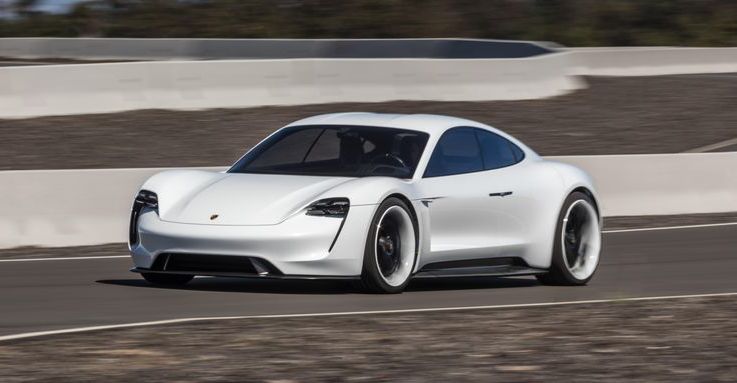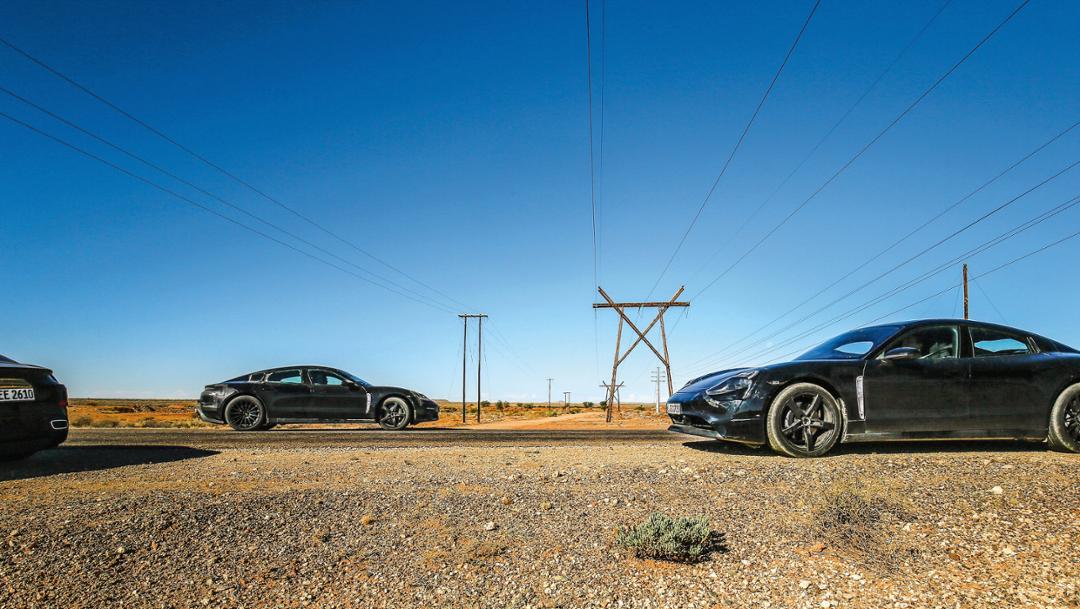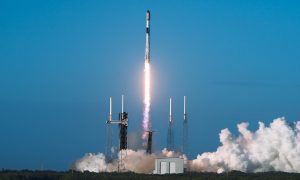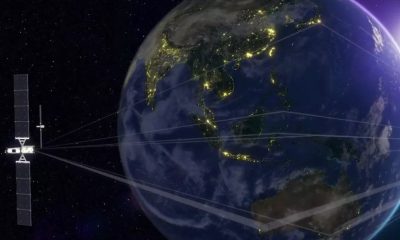

News
Porsche reveals Taycan specs: 310-mile range, ultra-fast charge 800V battery
Porsche dubs the Taycan, formerly known as the Mission E sedan, as one of its most important vehicles since the iconic Porsche 911. The upcoming all-electric, high-performance luxury sedan is expected to compete with some of the electric vehicle market’s most formidable mainstays, such as the Tesla Model S. With a drive unit developed from Porsche’s racing pedigree and battery tech that enables ultra-high-speed charging, the Taycan is set to make an impact when it starts production next year.
The auto market is starting a shift towards electric mobility, and the Taycan will be Porsche’s flag bearer for the next few years. By 2025, the legacy automaker is aiming for “every second Porsche sold to have an electric drive unit,” meaning half of its offerings would be fully electric and the other half will be plug-in hybrids. The Taycan is projected to hit a production rate of 20,000 vehicles per year, translating to roughly 67% of the current sales figures of the Porsche 911.
The Taycan is equipped with two permanently excited synchronous motors (PSM) that produce a combined 600 hp (440 kW). Porsche’s PSM motors were used by the company in the 919 Hybrid, a sports-prototype racing car that won the 24 Hours of Le Mans in the event’s Prototype-1 Hybrid (LMP1-H) category. The carmaker states that PSM electric motors are the “turbos of the electric motor milieu,” considering their capability to boast high sustained performance while maintaining maximum efficiency. Naser Abu Daqqa, director of electric drive systems at Porsche, described one of the strategies employed by the company to maximize the performance of the Taycan’s electric motors.
“The coils are made of wires that aren’t round, but rather rectangular. This makes it possible to pack the wires more tightly and get more copper into the coil machines—increasing power and torque with the same volume,” Abu Daqqa said.
Porsche’s battery unit for the Taycan is estimated to give the all-electric car a range of 310 miles per charge. In a press release, Porsche stated that lithium-ion batteries are utilized for the all-electric sedan’s battery pack. The Taycan is equipped with an 800-volt battery, comprised of cells that hold 4 volts each.
The Taycan’s battery unit prioritizes speed over weight. Instead of installing heavy batteries, Porsche opted to employ ultra-fast charging solutions instead, using an intelligent charging protocol and a heat exchanger system that can get the vehicles’ batteries up to operating temperature quickly and cooling them when needed. Due to its battery’s design, Porsche was able to use thinner cables on the vehicle as well, allowing the company to save even more weight.

The Taycan’s fast-charging system aims to add 248.5 miles worth of range in roughly 15 minutes. Dubbed the IONITY network, the ultra-fast-charging system is a joint venture with other automakers such as the BMW Group, Daimler AG, the Ford Motor Company, and the Volkswagen Group with Audi. IONITY’s chargers have a capacity of up to 350 kW per charging point, far above Tesla’s 120 kW Supercharger network. Porsche is exploring home charging solutions as well, including inductive charging via a base plate installed on a garage floor. Lastly, the Taycan will also be compatible with existing charging infrastructure in major cities.
As Porsche prepares to start manufacturing the vehicle next year, the company is currently hard at work testing prototypes of the electric car in several regions across the globe. In the western part of South Africa alone, 21 camouflaged Taycan prototypes are currently being deployed to test how the all-electric cars fare in hot weather. By the time the Taycan starts production in 2019, Porsche expects its test vehicles to have accumulated millions of kilometers worth of data from road tests.
The Taycan is expected to showcase Porsche’s trademark performance, with the vehicle being listed with a 0-60 mph time of 3.5 seconds, a range of 310 miles per charge, and a top speed of 155 mph. Pre-orders for the Taycan were recently opened to interested buyers and so far, Porsche has noted that the reception to the car has been very positive.
News
These Tesla, X, and xAI engineers were just poached by OpenAI
The news is the latest in an ongoing feud between Elon Musk and the Sam Altman-run firm OpenAI.

OpenAI, the xAI competitor for which Elon Musk previously served as a boardmember and helped to co-found, has reportedly poached high-level engineers from Tesla, along with others from xAI, X, and still others.
On Tuesday, Wired reported that OpenAI hired four high-level engineers from Tesla, xAI, and X, as seen in an internal Slack message sent by co-founder Greg Brockman. The engineers include Tesla Vice President of Software Engineering David Lau, X and xAI’s head of infrastructure engineering Uday Ruddarraju, and fellow xAI infrastructure engineer Mike Dalton. The hiring spree also included Angela Fan, an AI researcher from Meta.
“We’re excited to welcome these new members to our scaling team,” said Hannah Wong, an OpenAI spokesperson. “Our approach is to continue building and bringing together world-class infrastructure, research, and product teams to accelerate our mission and deliver the benefits of AI to hundreds of millions of people.”
Lau has been in his position as Tesla’s VP of Software Engineering since 2017, after previously working for the company’s firmware, platforms, and system integration divisions.
“It has become incredibly clear to me that accelerating progress towards safe, well-aligned artificial general intelligence is the most rewarding mission I could imagine for the next chapter of my career,” Lau said in a statement to Wired.
🚨Optimistic projections point to xAI possibly attaining profitability by 2027, according to Bloomberg's sources.
If accurate, this would be quite a feat for xAI. OpenAI, its biggest rival, is still looking at 2029 as the year it could become cash flow positive.💰 https://t.co/pE5Z9daez8
— TESLARATI (@Teslarati) June 18, 2025
READ MORE ON OPENAI: Elon Musk’s OpenAI lawsuit clears hurdle as trial looms
At xAI, Ruddarraju and Dalton both played a large role in developing the Colossus supercomputer, which is comprised of over 200,000 GPUs. One of the major ongoing projects at OpenAI is the company’s Stargate program,
“Infrastructure is where research meets reality, and OpenAI has already demonstrated this successfully,” Ruddarraju told Wired in another statement. “Stargate, in particular, is an infrastructure moonshot that perfectly matches the ambitious, systems-level challenges I love taking on.”
Elon Musk is currently in the process of suing OpenAI for shifting toward a for-profit model, as well as for accepting an investment of billions of dollars from Microsoft. OpenAI retaliated with a counterlawsuit, in which it alleges that Musk is interfering with the company’s business and engaging in unfair competition practices.
Elon Musk confirms Grok 4 launch on July 9 with livestream event
News
SpaceX share sale expected to back $400 billion valuation
The new SpaceX valuation would represent yet another record-high as far as privately-held companies in the U.S. go.

A new report this week suggests that Elon Musk-led rocket company SpaceX is considering an insider share sale that would value the company at $400 billion.
SpaceX is set to launch a primary fundraising round and sell a small number of new shares to investors, according to the report from Bloomberg, which cited people familiar with the matter who asked to remain anonymous due to the information not yet being public. Additionally, the company would sell shares from employees and early investors in a follow-up round, while the primary round would determine the price for the secondary round.
The valuation would represent the largest in history from a privately-owned company in the U.S., surpassing SpaceX’s previous record of $350 billion after a share buyback in December. Rivaling company valuations include ByteDance, the parent company of TikTok, as well as OpenAI.
Bloomberg went on to say that a SpaceX representative didn’t respond to a request for comment at the time of publishing. The publication also notes that the details of such a deal could still change, especially depending on interest from the insider sellers and share buyers.
Axiom’s Ax-4 astronauts arriving to the ISS! https://t.co/WQtTODaYfj
— TESLARATI (@Teslarati) June 26, 2025
READ MORE ON SPACEX: SpaceX to decommission Dragon spacecraft in response to Pres. Trump war of words with Elon Musk
SpaceX’s valuation comes from a few different key factors, especially including the continued expansion of the company’s Starlink satellite internet company. According to the report, Starlink accounts for over half of the company’s yearly revenue. Meanwhile, the company produced its 10 millionth Starlink kit last month.
The company also continues to develop its Starship reusable rocket program, despite the company experiencing an explosion of the rocket on the test stand in Texas last month.
The company has also launched payloads for a number of companies and government contracts. In recent weeks, SpaceX launched Axiom’s Ax-4 mission, sending four astronauts to the International Space Station (ISS) for a 14-day stay to work on around 60 scientific experiments. The mission was launched using the SpaceX Falcon 9 rocket and a new Crew Dragon capsule, while the research is expected to span a range of fields including biology, material and physical sciences, and demonstrations of specialized technology.
News
Tesla Giga Texas continues to pile up with Cybercab castings
Tesla sure is gathering a lot of Cybercab components around the Giga Texas complex.

Tesla may be extremely tight-lipped about the new affordable models that it was expected to start producing in the first half of the year, but the company sure is gathering a lot of Cybercab castings around the Giga Texas complex. This is, at least, as per recent images taken of the facility.
Cybercab castings galore
As per longtime drone operator Joe Tegtmeyer, who has been chronicling the developments around the Giga Texas complex for several years now, the electric vehicle maker seems to be gathering hundreds of Cybercab castings around the factory.
Based on observations from industry watchers, the drone operator appears to have captured images of about 180 front and 180 rear Cybercab castings in his recent photos.
Considering the number of castings that were spotted around Giga Texas, it would appear that Tesla may indeed be preparing for the vehicle’s start of trial production sometime later this year. Interestingly enough, large numbers of Cybercab castings have been spotted around the Giga Texas complex in the past few months.
Cybercab production
The Cybercab is expected to be Tesla’s first vehicle that will adopt the company’s “unboxed” process. As per Tesla’s previous update letters, volume production of the Cybercab should start in 2026. So far, prototypes of the Cybercab have been spotted testing around Giga Texas, and expectations are high that the vehicle’s initial trial production should start this year.
With the start of Tesla’s dedicated Robotaxi service around Austin, it might only be a matter of time before the Cybercab starts being tested on public roads as well. When this happens, it would be very difficult to deny the fact that Tesla really does have a safe, working autonomous driving system, and it has the perfect vehicle for it, too.
-

 Elon Musk1 week ago
Elon Musk1 week agoTesla investors will be shocked by Jim Cramer’s latest assessment
-

 News2 weeks ago
News2 weeks agoTesla Robotaxi’s biggest challenge seems to be this one thing
-

 Elon Musk1 day ago
Elon Musk1 day agoElon Musk confirms Grok 4 launch on July 9 with livestream event
-

 News2 weeks ago
News2 weeks agoWatch the first true Tesla Robotaxi intervention by safety monitor
-

 News5 days ago
News5 days agoTesla Model 3 ranks as the safest new car in Europe for 2025, per Euro NCAP tests
-

 Elon Musk2 weeks ago
Elon Musk2 weeks agoA Tesla just delivered itself to a customer autonomously, Elon Musk confirms
-

 Elon Musk2 weeks ago
Elon Musk2 weeks agoxAI welcomes Memphis pollution results, environmental groups push back
-

 Elon Musk2 weeks ago
Elon Musk2 weeks agoElon Musk confirms Tesla Optimus V3 already uses Grok voice AI


















